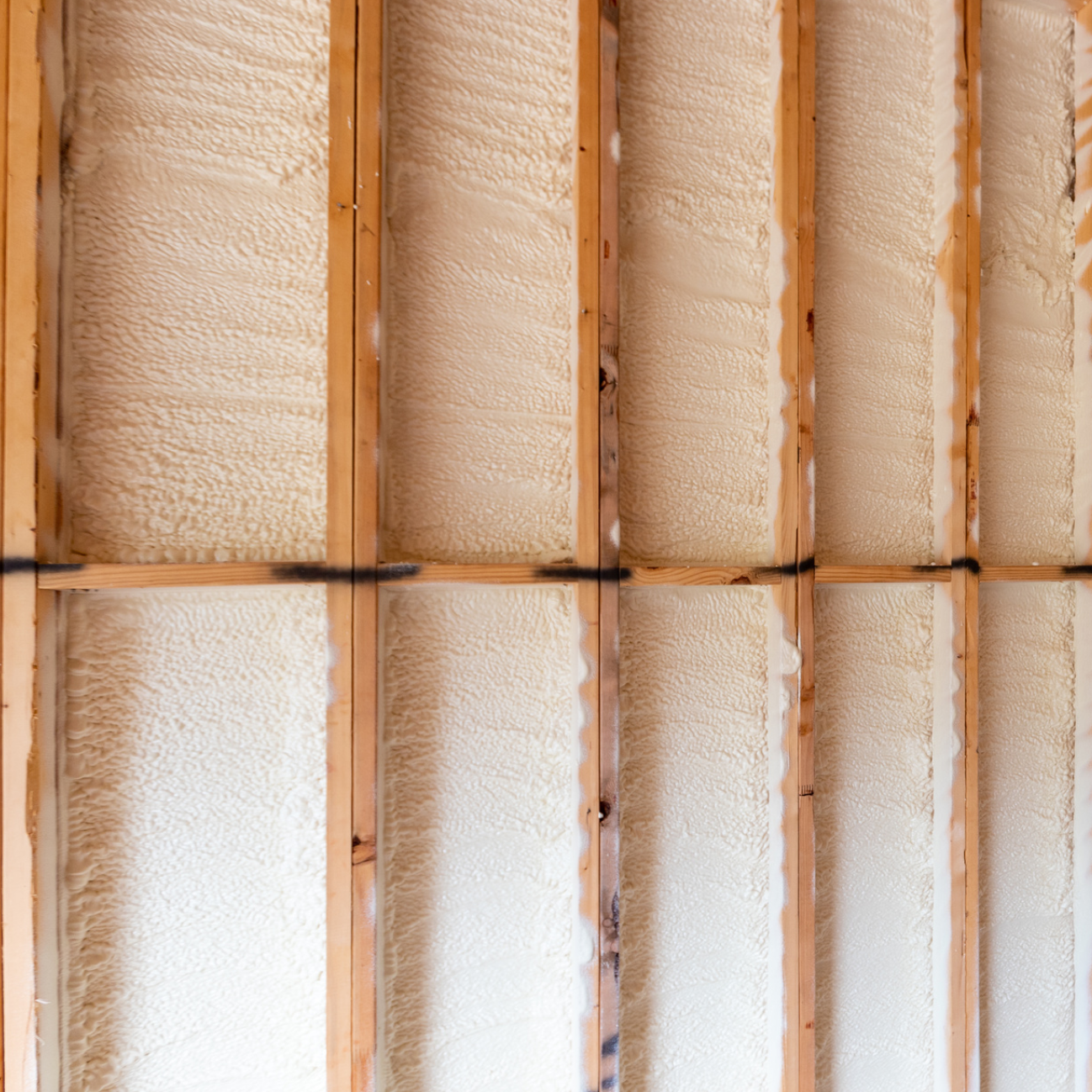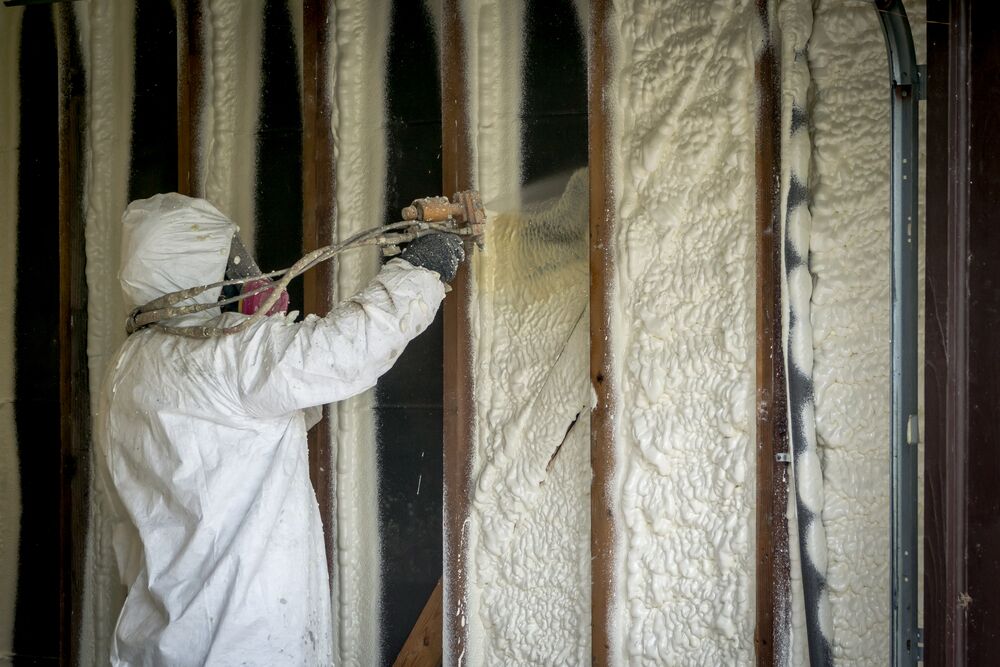The Environmental Impact of Spray Foam: Sustainability Considerations
The Environmental Impact of Spray Foam: Sustainability Considerations
Blog Article
Spray Foam: The Ultimate Option for Air Sealing and Insulation
Spray foam insulation has emerged as a leading solution for efficient air securing and thermal insulation, offering a special mix of buildings that set it besides standard techniques. Its capacity to expand and fill up voids makes it particularly efficient in protecting against air leakage, which can substantially influence power efficiency. Recognizing the complete scope of its benefits, installation processes, and comparisons with various other insulation kinds is critical for making informed decisions. As we explore these aspects, the ramifications for both brand-new constructions and retrofits become increasingly significant. What elements should influence your choice?
What Is Spray Foam?
Spray foam is a flexible insulation product that incorporates the principles of air sealing and thermal resistance to enhance power effectiveness in buildings. Made up largely of polyurethane or other comparable substances, spray foam is applied as a liquid that increases upon contact with surfaces, developing a solid, continuous layer of insulation. This one-of-a-kind residential property enables it to fill gaps, splits, and spaces that conventional insulation products may overlook, supplying a premium air seal.
There are 2 main kinds of spray foam: open-cell and closed-cell. Open-cell spray foam is lighter and much more adaptable, using excellent audio absorption and a lower R-value per inch - Spray Foam. In contrast, closed-cell spray foam is denser, giving a higher R-value, dampness resistance, and added architectural stability to constructing parts
The application process typically includes customized devices, ensuring a seamless application that complies with different substrates, including metal, timber, and concrete. This flexibility makes spray foam appropriate for both new building and constructions and retrofitting existing frameworks. Its ability to create an airtight obstacle significantly adds to decreasing power intake and improving indoor air top quality, thereby making it a preferred option amongst home owners and builders alike.
Benefits of Spray Foam Insulation
One of the most considerable benefits of spray foam insulation is its extraordinary capacity to develop a continual air barrier, which efficiently lessens power loss. Unlike standard insulation products, spray foam broadens to fill up fractures and spaces, making sure that air leak is substantially lowered. This particular not just enhances energy efficiency yet additionally brings about decrease energy costs over time.
Additionally, spray foam insulation provides superior thermal resistance, adding to an extra steady indoor atmosphere. Its high R-value per inch enables for efficient insulation in confined spaces, making it ideal for attic rooms, wall surfaces, and crawl areas. The moisture-resistant homes of spray foam assistance prevent mold and mildew and mildew development, advertising healthier living problems.
One more important benefit of spray foam insulation is its sound-dampening qualities (Spray Foam). It properly minimizes noise transmission in between spaces, creating a quieter and extra comfortable home setting. The longevity of spray foam likewise stands out, as it does not droop or clear up over time, keeping its performance throughout its life expectancy
How Spray Foam Functions
Understanding how spray foam insulation functions is vital for valuing its efficiency in air securing and thermal resistance. Spray foam insulation consists of 2 main parts: isocyanate and polyol resin. When these elements are mixed, they go through a chain reaction that causes the product to increase rapidly, developing a dense foam that fills up cracks, spaces, and dental caries.
As the foam expands, it follows surfaces, forming a closed seal that significantly Find Out More decreases air seepage. This particular makes spray foam insulation very effective at avoiding drafts and wetness infiltration, which can bring about energy loss and damage in time. Furthermore, the closed-cell variation of spray foam uses remarkable thermal resistance as a result of its rigid structure, efficiently reducing warm transfer.
The special properties of spray foam permit it to adhere to irregular surfaces, guaranteeing extensive protection and a seamless barrier. Therefore, spray foam insulation not just boosts power effectiveness yet also contributes to improved interior air top quality by decreasing the accumulation of allergens and pollutants. Eventually, comprehending the auto mechanics behind spray foam highlights its role as an exceptional choice for insulation and air sealing in both commercial and residential applications.
Installation Refine Introduction

Before setup, the area needs to be appropriately cleaned up and prepped, ensuring that surface areas are cost-free from wetness, dust, and particles. This action is vital because impurities can compromise adhesion and general performance. As soon as the location is prepared, the application involves blending both elements of the spray foam, which broadens upon contact and loads gaps successfully.
Educated professionals must carry out the installation, utilizing specialized tools to make sure uniform insurance coverage and optimum thickness. Safety and security safety measures, consisting of wearing safety gear and guaranteeing correct ventilation, are crucial throughout this procedure. After application, the foam generally treatments rapidly, forming a solid obstacle that enhances energy efficiency.
Comparing Spray Foam to Standard Insulation
When examining insulation alternatives, spray foam insulation stands apart in comparison to standard products such as fiberglass and cellulose. Among the key advantages of spray foam is its this website superior air securing abilities. Unlike fiberglass and cellulose, which can enable air seepage, spray foam expands upon application, filling holes and voids to produce an impermeable seal. This results in improved energy efficiency, as less heated or cooled air runs away the home, causing lower energy bills.
In addition, spray foam offers a greater R-value per inch than conventional insulation kinds, supplying more efficient thermal resistance in a thinner profile. This particular is especially advantageous precede with limited dental caries depth. Moreover, spray foam is immune to moisture and mold and mildew growth, which can be a considerable interest in cellulose and fiberglass, especially in moist environments.
However, spray foam insulation normally lugs a higher upfront expense than its traditional counterparts. House owners have to weigh this initial investment versus long-term energy cost savings and efficiency advantages. Ultimately, while both moved here insulation types serve their function, spray foam becomes a more sophisticated remedy for modern-day insulation demands, particularly in terms of air sealing and thermal efficiency.

Verdict
In recap, spray foam insulation stands for an extremely efficient option for accomplishing ideal air sealing and thermal resistance. Its distinct homes, consisting of wetness resistance and noise dampening, make it suitable for various applications in both brand-new building and constructions and retrofitting tasks (Spray Foam). Although the preliminary expenses may be greater contrasted to standard insulation materials, the long-term advantages, such as substantial energy savings and boosted interior air quality, warrant the financial investment and highlight its value in modern-day structure practices.
Spray foam insulation has actually emerged as a leading remedy for efficient air sealing and thermal insulation, supplying a special combination of properties that establish it apart from conventional approaches.Spray foam is a flexible insulation product that combines the principles of air sealing and thermal resistance to enhance power performance in buildings.When reviewing insulation choices, spray foam insulation stands out in contrast to conventional products such as fiberglass and cellulose. Ultimately, while both insulation kinds offer their purpose, spray foam arises as a more sophisticated solution for contemporary insulation demands, particularly in terms of air securing and thermal efficiency.
In recap, spray foam insulation stands for an extremely reliable solution for accomplishing optimum air securing and thermal resistance.
Report this page